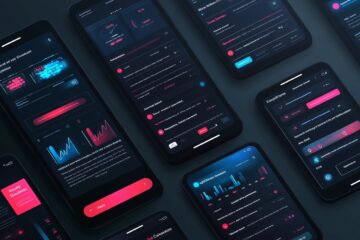As we progress into the digital era, a silent yet remarkable revolution occurs within the well-known internet. This revolutionary shift known as Web3 aims to decentralize the online realm, significantly altering our interactions with digital technologies. Forecasts predict that the global revenue of the Web 3.0 blockchain market will soar to USD 23.3 billion by 2028.
At the heart of this revolution lie Web3 Engineers, the innovative trailblazers responsible for constructing the infrastructure of this new digital landscape. You’ve come to the right place if you’ve ever pondered how to join their ranks. This article will serve as your guide, taking you to the essential skills required to enter this promising domain. Let’s embark on this journey together, exploring the exhilarating realm of Web3 engineering.
Who is a Web 3.0 Developer?
A Web3 developer is a specialized software developer who focuses on creating decentralized applications (dApps) using blockchain technology. They use various tools and programming languages, such as Solidity, Web3.js, and Truffle, to build and deploy self-executing smart contracts with the agreement terms written directly into the code.
In software development, these professionals can take on different roles based on their expertise: front-end, back-end, or full-stack developers. Some of them immerse themselves in the creation of blockchain dApps, those fascinating decentralized applications that interact directly with users. On the other hand, some dedicate their efforts to developing and fortifying smart contracts, ensuring the safety of virtual machines, and establishing secure communications across diverse blockchains.
Top Skills Every Web 3.0 Developer Must Have
Whether you’re an experienced programmer or just starting in coding, embracing the Web 3.0 environment will benefit you. Here are some crucial abilities required to become a successful Web3 developer:
Blockchain Understanding
Working with blockchain apps requires developers to adopt a distinct programming paradigm, as no centralized server is involved. The preferred language for blockchain development is usually Solidity, primarily used in the backend.
“On the other hand, front-end development remains relatively unchanged, relying on familiar technologies like HTML, JavaScript, and CSS. Web 3.0 developers need to become proficient in writing smart contracts to ensure the security of cryptocurrency transactions, as this occupies a significant portion of their time,” – said Oleksandr Trofimov, Chief Technology Officer at Artelogic.

Web development
Web 3.0 applications are still in their early stages, so developers must know the latest web development technologies and best practices. This includes things like front-end frameworks, back-end frameworks, and API development. In a study analyzing companies recruiting for Web 3.0 jobs, the top hard skills employers are looking for are developer skills, followed by Javascript skills.
Proficiency in Solidity
Among various blockchain coding languages, Solidity stands out as the most popular one. Learning Solidity can significantly enhance your employability since employers highly value developers who are proficient in it. However, above all, employers prioritize developers who can write bug-free code.
Smart Contract Development Experience
Preserving your privacy in the digital age can be challenging, but there is no room for complacency regarding the blockchain. Web 3.0 developers are involved in applications that handle user funds, and failure to thoroughly test and verify smart contracts could lead to irreversible loss of money for someone.
“Before being entrusted with creating and testing smart contracts, your employers will assess your knowledge of encryption, DoS attacks, and function defaults. It is essential to refresh your understanding of secure coding best practices for smart contracts, such as conducting audits and penetration testing, while developing a comprehensive security checklist,” – said Ihor Prudyvus, Engineering Director at Artelogic.
Knowledge of Web AR/VR Frameworks
The Metaverse and similar AR/VR games are poised to gain immense popularity once the technology becomes more affordable for consumers. As a web developer, you already know the fundamental AR/VR frameworks that utilize HTML, CSS, and Javascript.
“You’ll also need to familiarize yourself with Three.js, a tool for building websites with 3D content, and WebXR, which enables AR and VR experiences support. Additionally, knowledge of React.js, a JavaScript library that streamlines site development, will prove beneficial,” – added Ihor.
For those interested in creating mobile games, ARKit is an excellent option for iOS, while ARCore is well-suited for Android. On the other hand, if you aim to work for a central console or PC gaming studio, you must have a foundational understanding of Unity or Unreal before delving into AR or VR development.
JavaScript
In the Web 3.0 era, JavaScript is becoming increasingly important for building decentralized applications that run on blockchain networks. These applications often rely on smart contracts, self-executing contracts running on the blockchain. JavaScript can be used to write the code for these contracts, making it possible to build sophisticated decentralized applications that are highly secure and transparent.
Overall, understanding the versatility and power of JavaScript is critical to building modern web applications and taking advantage of the latest trends in the industry.
Exploring the Culture of Web 3.0
Without a strong understanding of your end user, it can be exceedingly difficult, if not impossible, to create a successful Web 3.0 product. Most accomplished Web 3.0 developers are active users of this technology themselves.
“If you’re not currently using Web3, you can begin by pondering the primary features that define this internet era. The essential elements of Web 3.0 include a semantic web, artificial intelligence, 3D graphics, ubiquity, and connectivity. Additionally, incorporating blockchain, decentralization, and edge computing is crucial,” – said Oleksandr Trofimov, Chief Technology Officer at Artelogic.
Communication
Developers in Web 3.0 are no longer confined to working in isolated silos. Instead, they must interact and cooperate with diverse stakeholders. This includes fellow team developers and those from different organizations and backgrounds. “By fostering open lines of communication, developers can exchange ideas, share knowledge, and address challenges collectively, leading to more efficient and effective development processes,” – explained Yaroslav Havryliv, Senior Engineering Manager at Artelogic.
Interesting fact! Communication skills are the top soft skill that can be favorable for a Web 3.0 role, with 24% of job adverts requiring this skill.
+4 Bonus Skills
- Decentralized Infrastructure Knowledge: A grasp of decentralized infrastructure components such as IPFS, Swarm, and Whisper is vital when designing decentralized applications.
- Cryptography Proficiency: A good understanding of cryptography concepts, such as public and private keys, encryption, and digital signatures, is vital for Web3 developers.
- Governance and Consensus Models Understanding: Web3 developers should know various consensus mechanisms like Proof of Stake, Proof of Work, and Delegated Proof of Stake.
- UX/UI design: Web 3.0 applications must be user-friendly and engaging, so developers must have strong UX/UI design skills. This includes things like wireframing, prototyping, and user testing.
Must-have Resources to Upskill Yourself for Web 3.0
- Web3 University: Offers a variety of lesson tracks that include tutorials on various topic areas of Web3 development, including NFT building, smart contract creation, and courses on blockchain-centric programming languages such as Solidity and Solana.
- The Web3 Foundation: This organization provides a wealth of resources on Web 3.0, including tutorials, blog posts, and events.
- Web3.career: Provides a list of free resources, including articles, books, boot camps, challenges, courses, news, tutorials, videos, and whitepapers for developers of all levels.
- Sensorium: Offers various courses on Web3 development and blockchain technology, including the Create Your First Smart Contract training, which is a good starting point for aspiring Web3 developers.
- Buildspace: Covers the fundamentals of Web3 development, from writing Solidity to minting NFTs to building full-stack dApps.
- Learnweb3: Provides guided paths for all types of experienced developers, from freshmen to seniors, to learn Web3.
In addition to these resources, there are several online communities where you can learn more about Web 3.0 and connect with other developers. Some of these communities include:
- ETHDenver: This annual conference is a great place to learn about the latest trends in Web 3.0.
- Devcon: This is another annual conference that focuses on Ethereum development.
- The Ethereum subreddit: This subreddit is a great place to ask questions and get help from other developers.
These resources can help you learn the skills needed for Web3 development and stay ahead of the curve in this rapidly evolving field.
Final thoughts
Embarking on the path of a Web3 engineer presents a thrilling voyage of discovery, where you can seize countless chances to expand your knowledge, drive innovation, and play a significant role in a groundbreaking technological revolution.
Web3 represents the next phase of the internet’s evolution, offering the potential to transform the digital realm completely. As a Web3 engineer, you can be at the forefront of this exciting transition. Though the journey may be demanding, the rewards are boundless. So, prepare yourself with essential skills, dive headfirst into the realm of Web3, and leave your indelible mark in shaping the Internet of the future.

New Trends in Energy Trading and Risk Management Software












